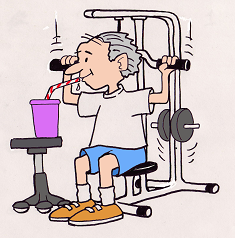COUNTERSTRIKE – Counteracting sarcopenia with proteins and exercise
PROJECT IS COMPLETED
Project period: 2015 – 2019
The main aim of COUNTERSTRIKE is to develop a tool for rapidly assessing age-related loss of skeletal muscle mass, termed sarcopenia, to find individual treatments to promote the maintenance of a healthy level of skeletal muscle mass.
The University of Copenhagen is running an ambitious intervention study Counteracting Age-related Loss of Skeletal Muscle Mass (CALM) aimed at providing evidence-based recommendations for alleviating sarcopenia through protein supplementation and exercise.
The project is collecting a large number of blood and faecal samples to determine the impact of increased protein intake and exercise on the gut microbiota and the blood metabolome.
COUNTERSTRIKE aims to complement the CALM project with a full metabolomics investigation of all samples in the CALM cohort with an emphasis on determining the lipoprotein particle distribution and linking this to gut microbiota, metabolomic potential and host physiological parameters focusing on skeletal muscle mass.
Global screening and individual counterstrike
The lipoprotein particle distribution predicts cardiovascular outcomes and is associated with obesity and insulin resistance. Body weight decreases with age, whereas a more atherogenic lipid profile is common, but little is known about the lipoprotein particle distribution in elderly people or the effect of exercise.
It is the ambition of this consortium, including national and international, academic and industrial partners, to establish a rapid screening method to determine the lipoprotein particle distribution based on nuclear magnetic resonance (NMR) spectroscopy, apply it to the CALM cohort and link the results to gut microbiota and host metabolism, making them available for future research.
A new spectroscopy-based screening method will enable the global screening of elderly people to determine each individual’s health status and allow for an individual “counterstrike” against sarcopenia.
COUNTERSTRIKE will
• Develop a novel analytical methodology for LPD determination, sufficiently rapid to allow for nation-wide screening efforts, which facilitate early diagnostics of not only sarcopenia, but also metabolic syndrome and related conditions, thus paving the way for development of personalised nutritional recommendations
• Investigate the complexity of sarcopenia by studying LPD changes in a large cohort of elderly as a function of increased exercise and protein intake and linking LPD changes to overall metabolome, GM and host physiology
• Determine whether there is a causal link between an unhealthy LPD and development of resistance towards muscle anabolic stimuli like exercise and protein
• Develop the knowledge obtained through state-of-art analytical platforms and advanced multivariate data-analysis into a format where it is readily communicable to elderly as well as policy makers in Denmark.
COUNTERSTRIKE will train 2 PhDs and 3 post docs within metabolomics, physiology and advanced data analysis and thus educate highly skilled scientists with flair for interdisciplinary work for the benefit of Danish industry.
Global screening and individual counterstrike
The prevention of age-related loss of skeletal muscle mass will have positive effects on each elderly person’s quality of life and simultaneously diminish the economic burden on society.
The lipoprotein particle distribution predicts cardiovascular outcomes and is associated with obesity and insulin resistance. Body weight decreases with age, whereas a more atherogenic lipid profile is common, but little is known about the lipoprotein particle distribution in elderly people or the effect of exercise.
Elderly lose up 2% of their skeletal muscle-mass per year, a condition termed "sarcopenia". In the coming years human longevity will increase in Western societies with huge socio-economic consequences. Thus, the ageing population should be encouraged to remain self-supportive, not only to diminish the economic burden for society, but also to retain their quality of life. University of Copenhagen is currently starting an ambitious intervention study “Counteracting Age-related Loss of Skeletal Muscle Mass (CALM)” aimed at providing evidence-based recommendations for alleviating sarcopenia through protein supplementation and exercise. The project includes collection of a large number of blood and faecal samples to determine the impact of increased protein intake and exercise on the gut microbiota (GM) and the blood metabolome. COUNTERSTRIKE aims to complement the CALM project with a full metabolomic investigation of all its 3000 samples with emphasis on determination of lipoprotein particle distribution (LPD) and linking this to GM metabolomic potential and host physiological parameters.
It is the ambition of this project that include national and international, academic and industrial power centres, to establish a rapid screening method for determination of LPD based on NMR spectroscopy, apply it to the CALM cohort and relate the results to GM and host metabolism and ultimately making it available for future research in for example personalized nutrition. The new screening method will allow for global screening of elderly to determine individual health status and facilitate a “COUNTERSTRIKE” against sarcopenia on the individual level creating a new business area for the European food industry.
It is the ambition of this consortium, including national and international, academic and industrial partners, to establish a rapid screening method to determine the lipoprotein particle distribution based on nuclear magnetic resonance (NMR) spectroscopy, apply it to the CALM cohort and link the results to gut microbiota and host metabolism, making them available for future research.
A new spectroscopy-based screening method will enable the global screening of elderly people to determine each individual’s health status and allow for an individual “counterstrike” against sarcopenia.
Associate Professor Dennis Sandris Nielsen
Department of Food ScienceUniversity of CopenhagenGrant holder and Coordinator, Head of WP3.
Department of Food ScienceUniversity of Copenhagen
Head of WP1.
Bispebjerg Hospital
Head of WP4.
Department of Nutrition, Exercise and SportsUniversity of Copenhagen
Runs WP2.
Head of Department, Professor Arne Astrup
Department of Nutrition, Exercise and SportsUniversity of CopenhagenHead of WP2.
Associate Professor Astrid P. Jespersen
The Saxo InstituteUniversity of CopenhagenHead of CALM, Head of WP6.
The Saxo InstituteUniversity of Copenhagen
Professor Age Smilde
Biosystems Data AnalysisUniversity of AmsterdamProfessor John van Duynhoven
Unilever and Wageningen UniversityLead Scientist Doris Jacobs
UnileverDirector of Applied NMR Business Development Dr. Manfred Spraul & Dr. Hartmut Schäfer
Bruker BioSpin GmbHResearch Scientist Simon M. M. Pedersen, PhD
Arla Strategic Research CentreArla Foods Amba
University of Copenhagen
Bispebjerg Hospital
University of Amsterdam
Funded by:

COUNTERSTRIKE has received DKK 15,633,418 from Innovation Fund Denmark
Additional funding from: Bruker BioSpin GmbH, Arla Foods Amba, Unilever R&D Vlaardingen, and all university partners
Project: Counteracting Sarcopenia with proteins and exercise - screening the CALM cohort for lipoprotein biomarkers - COUNTERSTRIKE
Period: 1 April 2015 - 31 August 2020

Brochures on sarcopenia and cholesterol
Two brochures on sarcopenia and cholesterol, respectively, have been published in connection with the COUNTERSTRIKE project.
